February 12, 2019 | Joanne Morrison
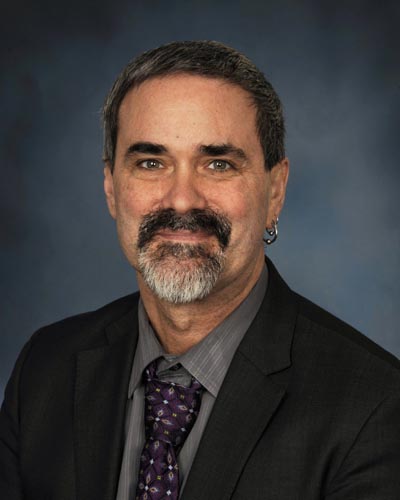
IGS Experts Assert That Scientific Progress Relies on Access to Genome Data and Call for Clear Guidelines on Usage
Researchers at the Institute for Genome Sciences (IGS) at the University of Maryland School of Medicine (UMSOM) called for open access to genome data, stating that unrestricted usage is needed for progress in combating the world’s most serious diseases.
Scientific progress relies on unconditional access to data that is hosted in open and accessible repositories, a group of genomic research leaders that included top IGS faculty stated in an article published in Science. They noted that while there are valid concerns and misconceptions about the rights of data producers, what is needed are clear, unambiguous guidelines for data usage.
“Advancing the genomics field forward requires strong affirmative policies towards open and unrestricted data sharing to promote inclusive community-driven research, translational science, as well as training activities,” said Owen White, PhD, Professor of Epidemiology and Public Health, Associate Director at IGS, and UMSOM Director of Bioinformatics.
In addition to Dr. White, other investigators at IGS who contributed to the paper include Claire Fraser, PhD, Professor of Medicine, Microbiology and Immunology and Director of IGS; Jacques Ravel, PhD, Professor of Microbiology & Immunology and Associate Director of Genomics at IGS, and Lynn Schriml, PhD, Associate Professor of Epidemiology & Public Health.
The scientists asserted that once data are publicly released following the data release rules of the agency that funded the project, they should be freely available for use without any restrictions or conditions. Additionally, the policies that govern data release should be applied uniformly, as opposed to being subject to nuanced interpretation on a project-by-project basis.
“Data access is critically important in advancing research to combat the most complex health issues such as cancer, cardiovascular disease and metabolic disorders,” said UMSOM Dean E. Albert Reece, MD, PhD, MBA, University Executive Vice President for Medical Affairs and the John Z. and Akiko K. Bowers Distinguished Professor.
About the University of Maryland School of Medicine
Now in its third century, the University of Maryland School of Medicine was chartered in 1807 as the first public medical school in the United States. It continues today as one of the fastest growing, top-tier biomedical research enterprises in the world -- with 43 academic departments, centers, institutes, and programs; and a faculty of more than 3,000 physicians, scientists, and allied health professionals, including members of the National Academy of Medicine and the National Academy of Sciences, and a distinguished recipient of the Albert E. Lasker Award in Medical Research. With an operating budget of more than $1 billion, the School of Medicine works closely in partnership with the University of Maryland Medical Center and Medical System to provide research-intensive, academic and clinically-based care for more than 1.2 million patients each year. The School has over 2,500 students, residents, and fellows, and more than $530 million in extramural funding, with most of its academic departments highly ranked among all medical schools in the nation in research funding. As one of the seven professional schools that make up the University of Maryland, Baltimore campus, the School of Medicine has a total workforce of nearly 7,000 individuals. The combined School and Medical System (“University of Maryland Medicine”) has an annual budget of nearly $6 billion and an economic impact more than $15 billion on the state and local community. The School of Medicine faculty, which ranks as the 8th highest among public medical schools in research productivity, is an innovator in translational medicine, with 600 active patents and 24 start-up companies. The School works locally, nationally, and globally, with research and treatment facilities in 36 countries around the world. Visit medschool.umaryland.edu/
About the Institute for Genome Sciences
The Institute for Genome Sciences, founded in 2007, is an international research center within the University of Maryland School of Medicine. Comprised of an interdisciplinary, multidepartment team of investigators, the Institute uses the powerful tools of genomics and bioinformatics to understand genome function in health and disease, to study molecular and cellular networks in a variety of model systems, and to generate data and bioinformatics resources of value to the international scientific community. igs.umaryland.edu
Contact
Department of Anesthesiology
(410) 328-6120 (phone)
(410) 328-5531 (fax)
swalsh@som.umaryland.edu
Joanne Morrison
Director of Marketing and Public Relations
University of Maryland School of Medicine
jmorrison@som.umaryland.edu
Office: (410) 706-2884
Mobile: (202) 841-3369
Related stories

Wednesday, November 05, 2025
NIH Awards $14.5 million Grant to the University of Maryland School of Medicine to Develop a Data Center for the Human Virome Program
The National Institutes of Health (NIH) has announced that it is launching a new research program to understand how the viruses that live within the human body or on the skin—known as the human virome—can impact a person’s health.
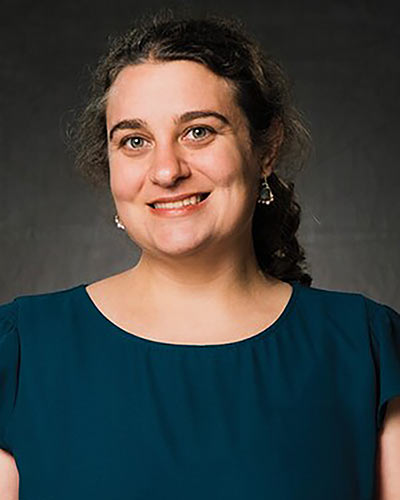
Wednesday, August 28, 2024
Leading Computational Scientist and Oncology Researcher Elana Fertig, PhD, Appointed as New Director of the Institute for Genome Sciences at the University of Maryland School of Medicine
University of Maryland School of Medicine (UMSOM) Dean Mark T. Gladwin, MD, announced today the appointment of Elana J. Fertig, PhD, FAIMBE, as the new Director of the School’s Institute for Genome Sciences (IGS). She is an internationally-recognized researcher known for her work in integrating spatial multi-omics technologies with mathematical models to develop a new predictive medicine paradigm in cancer. Spatial technologies allow researchers to learn about any cell type inside of natural tissue, including gene activity and cell interactions.
.jpg)
Wednesday, March 01, 2023
Internationally-Renowned Scientist Claire Fraser, PhD, To Step Down as Director of the University of Maryland School of Medicine's Institute for Genome Sciences
Claire Fraser, PhD, a pioneer and global leader in genomic research, has announced that she will step down from her position as Director of the Institute for Genome Sciences (IGS) in the University of Maryland School of Medicine (UMSOM). She will now continue as the Dean E. Albert Reece Endowed Professor and Professor of Medicine and Microbiology and Immunology at UMSOM and scientist at IGS until she retires in 2024.

Thursday, July 28, 2022
Researchers Discover One of the Largest Known Bacteria-to-Animal Gene Transfer Inside a Fruit Fly
A fruit fly genome is not a just made up of fruit fly DNA – at least for one fruit fly species. New research from the University of Maryland School of Medicine’s (UMSOM) Institute for Genome Sciences (IGS) shows that one fruit fly species contains whole genomes of a kind of bacteria, making this finding the largest bacteria-to-animal transfer of genetic material ever discovered. The new research also sheds light on how this happens.
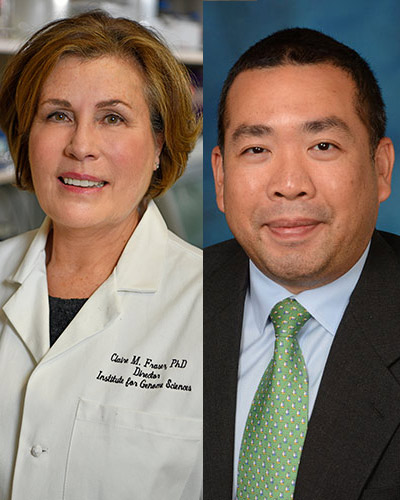
Thursday, June 23, 2022
New Research Shows Mothers’ HIV Status, Breastfeeding, and the Infant Gut Microbiome Can Have Long-Term Impact on Infant Health
Babies born to women with HIV often have poorer health and under-developed growth in the early months of life than infants born to women without the infection — even if those babies don’t contract HIV during birth, according to a new study by researchers at the University of Maryland School of Medicine (UMSOM)’s Institute for Genome Sciences (IGS) and Institute of Human Virology (IHV). The study also provides new insights into why these health issues often continue throughout the babies’ lives.

Tuesday, February 01, 2022
Study: Losing Excess Weight in Adulthood Reduces Risk of Developing Polyps that can Lead to Colorectal Cancer
Weight loss for adults, particularly those who are overweight or obese, may reduce their risk of developing a type of polyp that can lead to colorectal cancer, according to a new study led by researchers at the University of Maryland School of Medicine (UMSOM). Findings were published today in the journal JNCI Cancer Spectrum.
.jpg)
Wednesday, September 15, 2021
Probiotic-Containing Yogurt Protects Against Microbiome Changes That Lead to Antibiotic-Induced Diarrhea, Study Finds
Eating yogurt containing a particular strain of a well-studied probiotic appears to protect against harmful changes in the gut microbiome that are associated with antibiotic administration. That is the finding from a new randomized clinical trial, led by researchers at the University of Maryland School of Maryland (UMSOM), the University of Maryland School of Pharmacy (UMSOP), and Georgetown University Medical Center, which was recently published in the journal Nutrients.

Thursday, March 18, 2021
UM School of Medicine Helps Maryland Conduct State-Wide Sequencing of Variants in Positive COVID-19 Test Specimens
In an effort to monitor the spread of COVID-19 variants in the State of Maryland, University of Maryland School of Medicine (UMSOM) Dean E. Albert Reece, MD, PhD, MBA, announced that UMaryland Genomics at UMSOM will perform genome sequencing of variants in at least 10 percent of COVID-19 test samples, reaching an important benchmark set by the federal government to help control the spread of these variants.
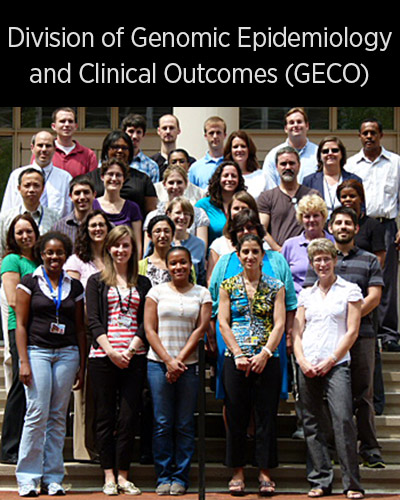
Thursday, March 05, 2020
Preventing COVID-19 (coronavirus) in Maryland Hospitals:
Hospital epidemiologists are doctors who prevent infections. World leaders in hospital epidemiology and infectious disease prevention, the physicians and scientists based in the Division of Genomic Epidemiology and Clinical Outcomes (GECO) at the University of Maryland School of Medicine are preparing our healthcare system for COVID-19 and COVID-19 transmission prevention.

Tuesday, December 03, 2019
UM School of Medicine Researchers Institute for Genome Sciences' Researchers Discover Potential New Treatment for Tropical Parasitic Disease Using Genomics
Using innovative RNA sequencing techniques, researchers at the University of Maryland School of Medicine (UMSOM) Institute for Genome Sciences identified a promising novel treatment for lymphatic filariasis, a disabling parasitic disease that is difficult to treat. The potential new therapy is an experimental cancer drug called JQ1 and targets proteins found prominently in the worm’s genome; it appears to effectively kill the adult worms in a laboratory setting, according to the study which was published today in the journal mSystems.

Tuesday, September 10, 2019
Multicomponent Home-Based Treatments Improve Mobility in Older Adults After Hip Fracture, New Research Shows
Each year more than 260,000 older Americans are hospitalized for hip fractures, a debilitating injury that can severely and permanently impact mobility. Researchers at the University of Maryland School of Medicine (UMSOM) studied two types of home-based interventions and discovered that these treatments are effective in helping individuals regain their ability to walk, but not enough to do every day functions like crossing the street.

Thursday, September 05, 2019
UMSOM's Dr. Jay Magaziner Elected President of Fragility Fracture Network
Jay Magaziner, PhD, MSHyg, Professor and Chair of the Department of Epidemiology and Public Health at the University of Maryland School of Medicine (UMSOM), was elected to serve as president of the Fragility Fracture Network (FFN), a global network of professionals that help sets policy and care standards for treatment and secondary prevention of serious fractures impacting mobility, such as spinal and hip fractures.

Tuesday, August 13, 2019
Researchers Identify How Vaginal Microbiome Can Elicit Resistance or Susceptibility to Chlamydia
The vaginal microbiome is believed to protect women against Chlamydia trachomatis, the etiological agent of the most prevalent sexually transmitted infections (STIs) in developed countries. New research by the University of Maryland School of Medicine (UMSOM) shows how the microbiome can either protect or make a woman more susceptible to these serious infections.

Wednesday, May 29, 2019
The Human Microbiome Project expands the toolbox for studying host and microbiome interactions
New studies provide a framework for future studies of the role of the microbiome in health and disease.

Thursday, April 04, 2019
UM School of Medicine's Institute for Genome Sciences Awarded $17.5 Million Grant for Infectious Disease Research
The Institute for Genome Sciences (IGS) at the University of Maryland School of Medicine (UMSOM) was awarded $17.5 million from the National Institute of Allergy and Infectious Diseases (NIAID) to fund the IGS Genome Center for Infectious Diseases (GCID) for another five years.

Wednesday, March 27, 2019
New Study Finds That Bacteria and Immunity in the Cervix May be Key to Predicting Premature Birth
Spontaneous preterm birth (sPTB), defined as birth before 37 weeks of gestation, and the related complications, are the largest contributors to infant death in the United States and worldwide, according to the World Health Organization. Researchers at the University of Maryland School of Medicine (UMSOM) have discovered that bacteria and innate immune factors in a woman’s birth canal and cervix may increase the risk of spontaneous preterm birth or provide protection against such births.
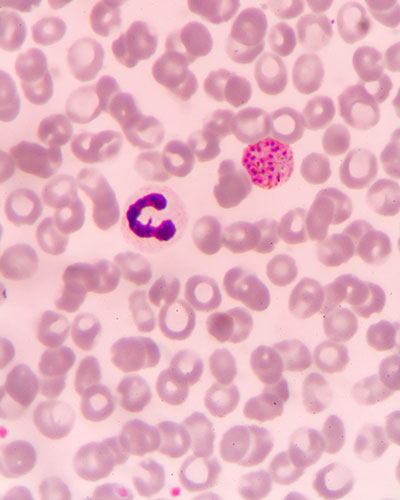
Friday, February 08, 2019
University of Maryland School of Medicine Genome Scientists Develop Novel Approaches to Studying the Most Widespread Form of Malaria
Scientists at the Institute of Genome Sciences (IGS) at the University of Maryland School of Medicine (UMSOM) have developed a novel way with genome sequences to study and better understand transmission, treat and ultimately eradicate Plasmodium vivax, the most widespread form of malaria.

Tuesday, December 04, 2018
UMSOM/UMSOP Researchers Awarded $1.78 Million Grant to Study Brain-To-Gut Connection in Schizophrenia
Researchers at the University of Maryland School of Medicine’s (UMSOM) Maryland Psychiatric Center (MPRC) and Institute for Genome Sciences (IGS), along with researchers at the University of Maryland School of Pharmacy (UMSOP), have been awarded a collaborative five-year $1.78 million grant to study the brain-to-gut connection in schizophrenia.

Thursday, September 27, 2018
University of Maryland School of Medicine Scientist Receives Prestigious Microbiome Award
Owen White, PhD, professor of epidemiology and public health, and Associate Director for Informatics at the Institute for Genome Sciences (IGS) at the University of Maryland School of Medicine (UMSOM), has received the 2018 Microbiome Pioneer Award. The prestigious honor is part of the Bioinformatics for the Microbiome Symposium organized by Stanford University. The microbiome is the name given collectively to the community of trillions of microbial organisms that live on and within our bodies.

Monday, July 23, 2018
In Memoriam: Edson X. Albuquerque, MD, PhD, Internationally-Renowned Pharmacologist and Toxicologist at UM School of Medicine
Edson Xavier Albuquerque, MD, PhD, an internationally-acclaimed toxicologist who had served on the UM School of Medicine faculty since 1974, has passed away.

Monday, June 18, 2018
Dr. Diane Marie St. George Promoted to Vice Chair of Academic Programs in the Department of Epidemiology and Public Health
Jay Magaziner, PhD, MS Hyg, Professor and Chair of the Department of Epidemiology and Public Health (EPH) at the University of Maryland School of Medicine (UMSOM), along with UMSOM Dean E. Albert Reece, MD, PhD, MBA, announced today that Diane Marie St. George, PhD, has been promoted from Director to Vice Chair of Academic Programs in the Department of Epidemiology and Public Health. The position was previously held by Patricia Langenburg, PhD, Professor Emeritus.
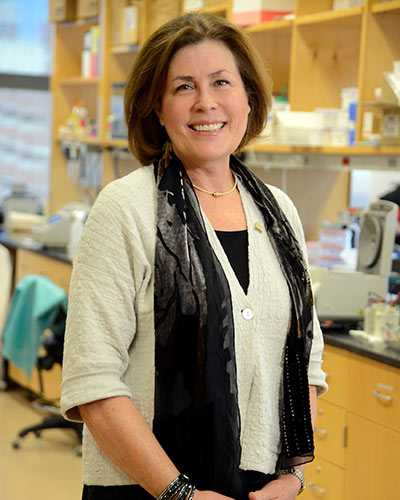
Monday, May 14, 2018
New Research: Some Gut Bacteria May Protect Against Intestinal Infection
Scientists at the University of Maryland School of Medicine (UMSOM) have for the first time found evidence that the presence of a key species in the human gut microbiome is associated with protection from infection with typhoid fever. If the research is borne out, it could offer an exciting new way to reduce intestinal infections from microbes.

Wednesday, May 25, 2016
UMSOM Researchers Develop New Way to Decode Large Amounts of Biological Data
A University of Maryland School of Medicine researcher has helped develop an innovative computing technique that, on very large amounts of data, is both faster and more accurate than current methods. To spur research, a program using this technique is being offered for free to the biomedical research community.

Tuesday, March 22, 2016
Program in Health Disparities and Population Health at University of Maryland School of Medicine Moving Forward in Department of Epidemiology and Public Health
Jay S. Magaziner, PhD, MS, Hyg, Professor and Chair, Department of Epidemiology and Public Health (EPH) at the University of Maryland School of Medicine (UM SOM) and Dean E. Albert Reece, MD, PhD, MBA, announced today that the Program in Health Disparities and Population Health, formerly the Program in Minority Health and Health Disparities in Education and Research (PMHHD) led by the now-retired Dr. Claudia Baquet, has a new home in the Department of Epidemiology and Public Health.

Wednesday, March 16, 2016
UM SOM Epidemiologist Joanne F. Dorgan Named Director of the Division of Cancer Epidemiology
Jay S. Magaziner, PhD, MS Hyg, Professor and Chair of the Department of Epidemiology and Public Health (EPH) in the University of Maryland School of Medicine (UM SOM), along with UM SOM Dean E. Albert Reece, MD, PhD, MBA, announced today that Joanne F. Dorgan, PhD, MPH, Professor in the Division of Cancer Epidemiology within the Department of Epidemiology and Public Health, has been appointed Director of the Division of Cancer Epidemiology. Dorgan succeeds Division Director William A. Blattner, MD, co-founder and associate director of the UM SOM Institute of Human Virology, who retired on January 31, 2016.

Monday, February 08, 2016
UM SOM Researchers Identify Most Dangerous Strains of Often-Deadly Bacteria
A multi-disciplinary group of researchers at the University of Maryland School of Medicine (UM SOM) have for the first time determined the genetic makeup of various strains of E. coli, which every year kills hundreds of thousands of people around the world.

Thursday, January 21, 2016
UM SOM Board Member and Benefactor Robert E. Fischell, Awarded Presidential Medal
The White House has awarded Robert E. Fischell, ScD, a member of the University of Maryland School of Medicine (UM SOM) Board of Visitors, the National Medal of Technology and Innovation, the highest honor for technological achievement bestowed by the president of the United States. Previous recipients have included such luminaries as Steven Jobs and Stephen Wozniak (Apple Computer, Inc.), Stephen D. Bechtel, Jr. (Bechtel Group, Inc.), David Packard (Hewlett-Packard Company), Clarence L. Johnson (Lockheed Corporation), Edwin H. Land (Polaroid Corporation) and Edith Flanigen (Union Carbide).
